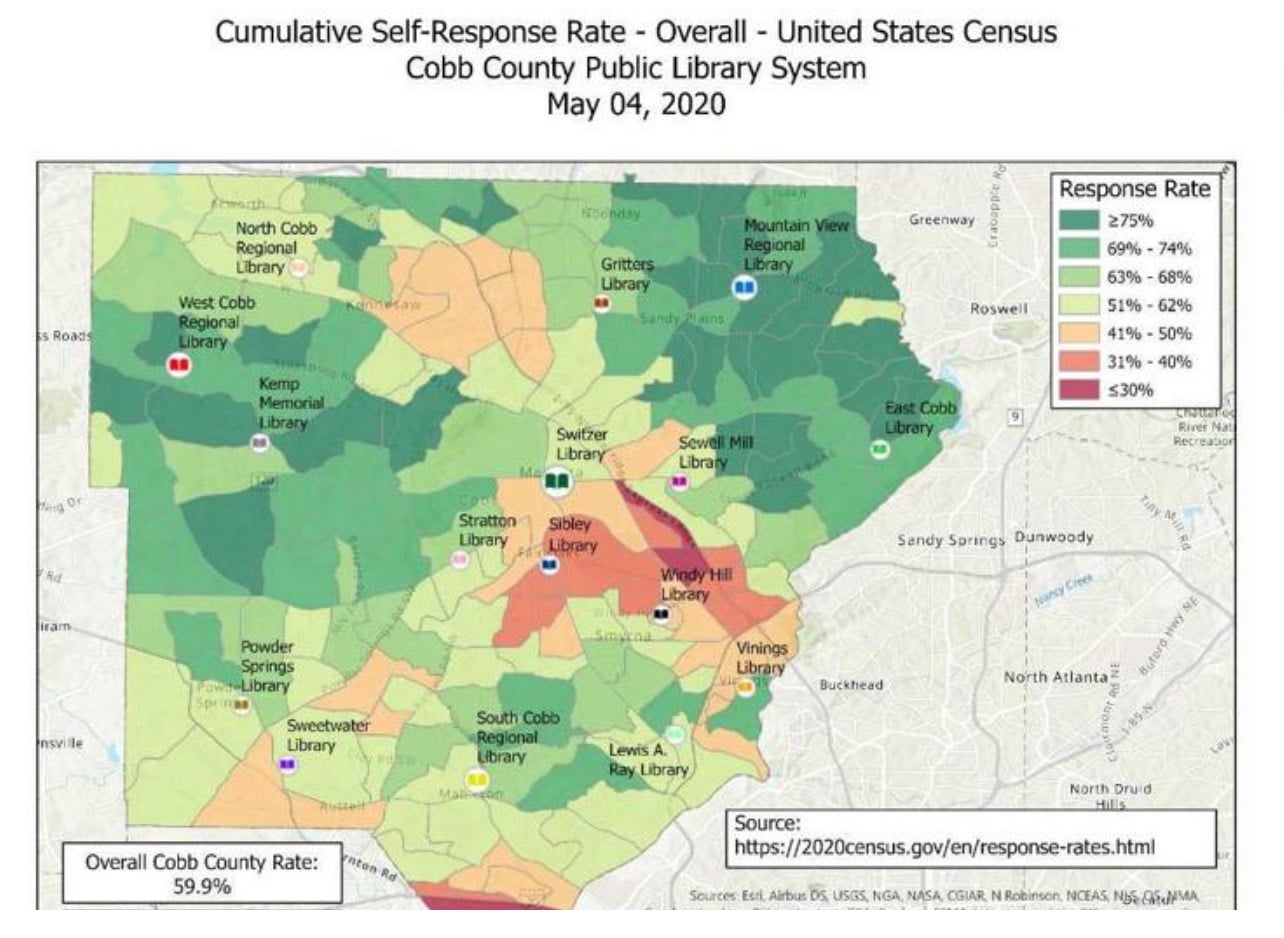Cobb Census Advocates Stress Civic Duty as Pandemic Depresses Response
Print This Post
Instead of targeting outdoor events like festivals, Cobb officials have had to switch to online census campaigns and distributing census materials with free meals from schools and senior centers, as well as the Department of Public Health.
By Meris Lutz, The Atlanta Journal-Constitution
The COVID-19 pandemic has undermined efforts to boost Cobb’s response rate for the 2020 census, leaving local organizers scrambling to adapt outreach efforts amid a widespread shutdown that has disrupted nearly every aspect of daily life.
Now, instead of targeting outdoor events like festivals, they have had to switch to online campaigns and distributing census materials with free meals from schools and senior centers, as well as through the Department of Public Health.
Census forms were mailed out in March and current response rates reflect how many people have filled them out on their own — referred to as the “self-response” rate. This was the first year residents were given the option of responding online or by phone or mail.
Irene Barton, executive director of The Cobb Collaborative and a member of Cobb’s “Complete Count” census committee, called the self-response rate so far “a little discouraging” at just about 60 percent countywide, with wide disparities between high and low-income areas. She emphasized the importance of collecting an accurate census count, which affects everything from political representation to funding for essential services like education, healthcare, transportation and housing.
“People say, ‘Oh, the census is the last thing on people’s mind,’ but ironically it is one thing we can do, like putting a mask on or social distancing, to help ourselves down the road,” she said. “Really, it is something that we should be focused on.”
Cobb’s self response rate is higher than Georgia’s rate of 53 or the national rate of 57. But the county still lags behind its 2010 response rate of 67, despite doubled efforts to promote the census among hard-to-count populations. The under-count in 2010 is estimated to have lost the county $250 million in federal funds.
In Cobb, census tracts in the southern tip of the county and the area south and east of the city of Marietta, including I-75, have the lowest self-response rates — some below 30 percent. The western and northeast sections of the county have response rates mostly above 60 percent.
Barton said areas with lower response rates tend to be lower income with larger communities of African Americans or residents for whom English is a second language.
Normally, she said, now is the time Cobb would be closing the gap, and census workers would start going door to door looking for uncounted households in June. But field operations have been suspended due to the virus. In addition to partnering with the schools, senior centers, and public health department, she and the rest of the committee have reached out to churches, civic organizations and community leaders to try and get the word out.
Tom Brooks, a communications specialist with the Cobb Library System, which has been heavily involved with census outreach, said the impact of the pandemic has been a “huge disappointment.”
The libraries had already begun hosting census events for teens and children, and had dedicated computers for residents without internet access at home to respond. Now, some of those events have moved online, and the library has had to re-brand its campaign.
“The big theme is the notion that in this challenging time, this is a bright spot,” he said. “You can respond to the census and really feel like you can contribute to the community.”
County Commissioner Bob Ott, whose district includes some of the census tracts with the lowest response rates, said he was concerned about the potential impact to his district of an under-count.
“In some ways, I’m surprised the numbers are as high as they are, considering it got sidelined by the virus,” he said. Although he has started including census information in his weekly email newsletter, he added, “I’m not sure if there’s a whole lot that can be done right now.”
Read the story on ajc.com.
The Cobb Collaborative is a member of the Georgia Family Connection statewide network.
Georgia Family Connection brings together more than 3,000 local- and state-level partners in all 159 counties in Georgia working toward measurably better outcomes for our children, families, and communities. Georgia Family Connection is the only statewide network of its kind in the country. This gives us a unique vantage point—not only to see the big picture, but also to operate effectively at a local level.
